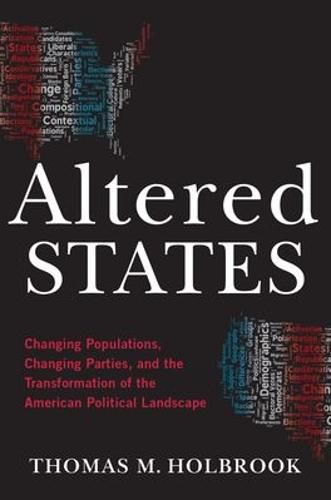Readings Newsletter
Become a Readings Member to make your shopping experience even easier.
Sign in or sign up for free!
You’re not far away from qualifying for FREE standard shipping within Australia
You’ve qualified for FREE standard shipping within Australia
The cart is loading…






The 2012 presidential elections represented the second consecutive defeat for the Republican Party, and its fourth defeat out of the last six presidential elections. In recent years both Republican and Democratic strategists and pundits have spoken of an emerging Democratic Party lock on the Electoral College and speculated that even in the wake of Republican victories in Congress, presidential candidates are still at a major disadvantage due to the party’s increasing demographic and geographic isolation. In Altered States, Thomas Holbrook looks at change in party fortunes in presidential elections since 1972, documenting the magnitude, direction, and consequences of changes in party support in the states. He finds that the Democrats do not have a lock on the Electoral College, but that their position has improved dramatically over the past forty years in a number of formerly competitive or Republican-leaning states in the Northeast, Southeast, and Southwest. Republican candidates have made many fewer gains, mostly improving their position in misplaced, formerly Democratic states, such as Kentucky and West Virginia, or in already deeply Republican states in the Plains and Mountain West. Holbrook looks at the ways that changes in the racial and ethnic composition of the state electorates, internal (state to state) and external (foreign born) migratory patterns, and changes in other key demographic and political characteristics drive these changes. Additionally, he explores the ways in which increasing partisan polarization at the national level has altered group-based party linkages and contributed to changes in party support at the state level. These factors, along with an increasingly inefficient distribution of Republican votes, have converted what was once a Republican edge in electoral votes to an advantage for Democratic presidential candidates.
$9.00 standard shipping within Australia
FREE standard shipping within Australia for orders over $100.00
Express & International shipping calculated at checkout
The 2012 presidential elections represented the second consecutive defeat for the Republican Party, and its fourth defeat out of the last six presidential elections. In recent years both Republican and Democratic strategists and pundits have spoken of an emerging Democratic Party lock on the Electoral College and speculated that even in the wake of Republican victories in Congress, presidential candidates are still at a major disadvantage due to the party’s increasing demographic and geographic isolation. In Altered States, Thomas Holbrook looks at change in party fortunes in presidential elections since 1972, documenting the magnitude, direction, and consequences of changes in party support in the states. He finds that the Democrats do not have a lock on the Electoral College, but that their position has improved dramatically over the past forty years in a number of formerly competitive or Republican-leaning states in the Northeast, Southeast, and Southwest. Republican candidates have made many fewer gains, mostly improving their position in misplaced, formerly Democratic states, such as Kentucky and West Virginia, or in already deeply Republican states in the Plains and Mountain West. Holbrook looks at the ways that changes in the racial and ethnic composition of the state electorates, internal (state to state) and external (foreign born) migratory patterns, and changes in other key demographic and political characteristics drive these changes. Additionally, he explores the ways in which increasing partisan polarization at the national level has altered group-based party linkages and contributed to changes in party support at the state level. These factors, along with an increasingly inefficient distribution of Republican votes, have converted what was once a Republican edge in electoral votes to an advantage for Democratic presidential candidates.